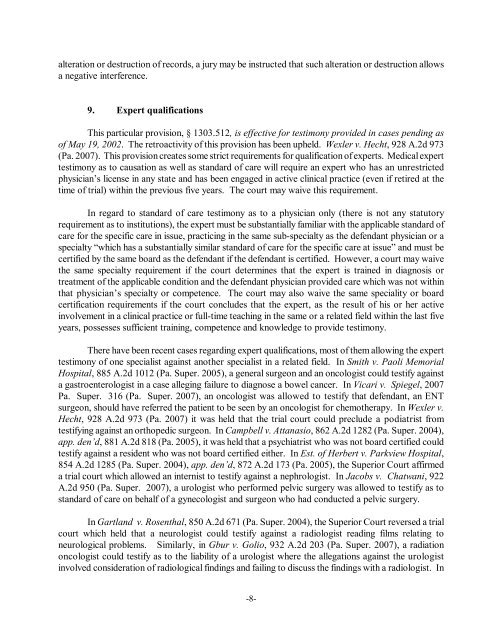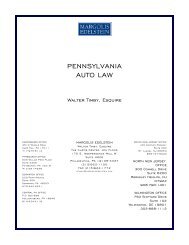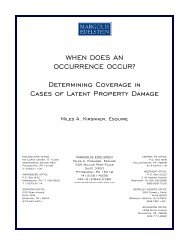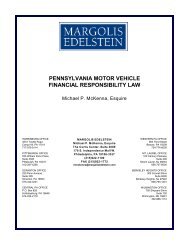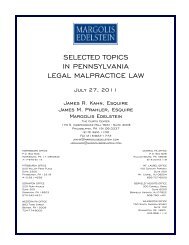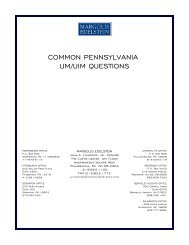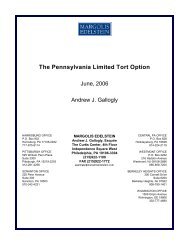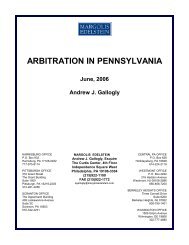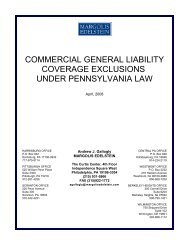recent developments in pennsylvania medical malpractice law
recent developments in pennsylvania medical malpractice law
recent developments in pennsylvania medical malpractice law
Create successful ePaper yourself
Turn your PDF publications into a flip-book with our unique Google optimized e-Paper software.
alteration or destruction of records, a jury may be <strong>in</strong>structed that such alteration or destruction allowsa negative <strong>in</strong>terference.9. Expert qualificationsThis particular provision, § 1303.512, is effective for testimony provided <strong>in</strong> cases pend<strong>in</strong>g asof May 19, 2002. The retroactivity of this provision has been upheld. Wexler v. Hecht, 928 A.2d 973(Pa. 2007). This provision creates some strict requirements for qualification of experts. Medical experttestimony as to causation as well as standard of care will require an expert who has an unrestrictedphysician’s license <strong>in</strong> any state and has been engaged <strong>in</strong> active cl<strong>in</strong>ical practice (even if retired at thetime of trial) with<strong>in</strong> the previous five years. The court may waive this requirement.In regard to standard of care testimony as to a physician only (there is not any statutoryrequirement as to <strong>in</strong>stitutions), the expert must be substantially familiar with the applicable standard ofcare for the specific care <strong>in</strong> issue, practic<strong>in</strong>g <strong>in</strong> the same sub-specialty as the defendant physician or aspecialty “which has a substantially similar standard of care for the specific care at issue” and must becertified by the same board as the defendant if the defendant is certified. However, a court may waivethe same specialty requirement if the court determ<strong>in</strong>es that the expert is tra<strong>in</strong>ed <strong>in</strong> diagnosis ortreatment of the applicable condition and the defendant physician provided care which was not with<strong>in</strong>that physician’s specialty or competence. The court may also waive the same speciality or boardcertification requirements if the court concludes that the expert, as the result of his or her active<strong>in</strong>volvement <strong>in</strong> a cl<strong>in</strong>ical practice or full-time teach<strong>in</strong>g <strong>in</strong> the same or a related field with<strong>in</strong> the last fiveyears, possesses sufficient tra<strong>in</strong><strong>in</strong>g, competence and knowledge to provide testimony.There have been <strong>recent</strong> cases regard<strong>in</strong>g expert qualifications, most of them allow<strong>in</strong>g the experttestimony of one specialist aga<strong>in</strong>st another specialist <strong>in</strong> a related field. In Smith v. Paoli MemorialHospital, 885 A.2d 1012 (Pa. Super. 2005), a general surgeon and an oncologist could testify aga<strong>in</strong>sta gastroenterologist <strong>in</strong> a case alleg<strong>in</strong>g failure to diagnose a bowel cancer. In Vicari v. Spiegel, 2007Pa. Super. 316 (Pa. Super. 2007), an oncologist was allowed to testify that defendant, an ENTsurgeon, should have referred the patient to be seen by an oncologist for chemotherapy. In Wexler v.Hecht, 928 A.2d 973 (Pa. 2007) it was held that the trial court could preclude a podiatrist fromtestify<strong>in</strong>g aga<strong>in</strong>st an orthopedic surgeon. In Campbell v. Attanasio, 862 A.2d 1282 (Pa. Super. 2004),app. den’d, 881 A.2d 818 (Pa. 2005), it was held that a psychiatrist who was not board certified couldtestify aga<strong>in</strong>st a resident who was not board certified either. In Est. of Herbert v. Parkview Hospital,854 A.2d 1285 (Pa. Super. 2004), app. den’d, 872 A.2d 173 (Pa. 2005), the Superior Court affirmeda trial court which allowed an <strong>in</strong>ternist to testify aga<strong>in</strong>st a nephrologist. In Jacobs v. Chatwani, 922A.2d 950 (Pa. Super. 2007), a urologist who performed pelvic surgery was allowed to testify as tostandard of care on behalf of a gynecologist and surgeon who had conducted a pelvic surgery.In Gartland v. Rosenthal, 850 A.2d 671 (Pa. Super. 2004), the Superior Court reversed a trialcourt which held that a neurologist could testify aga<strong>in</strong>st a radiologist read<strong>in</strong>g films relat<strong>in</strong>g toneurological problems. Similarly, <strong>in</strong> Gbur v. Golio, 932 A.2d 203 (Pa. Super. 2007), a radiationoncologist could testify as to the liability of a urologist where the allegations aga<strong>in</strong>st the urologist<strong>in</strong>volved consideration of radiological f<strong>in</strong>d<strong>in</strong>gs and fail<strong>in</strong>g to discuss the f<strong>in</strong>d<strong>in</strong>gs with a radiologist. In-8-


